Let me tell you why Bulalo holds such a special place in my heart. Nothing beats the moment when that steaming bowl of crystal-clear soup hits our dining table, especially during those rainy afternoons when the whole family's home. I've spent years perfecting my Lola's Bulalo recipe, and let me tell you, that moment when the beef just slides off the bone and the marrow melts into the golden broth? Pure magic!
While this bulalo recipe takes a bit of patience (good things can't be rushed, 'di ba?), it's absolutely worth every minute. I've broken down my Lola's secrets for achieving that perfectly clear broth and melt-in-your-mouth tender meat that rivals even the best bulaluhan in Batangas.
Get ready to create your own family food memories with this authentic Bulalo recipe that's been tested, tweaked and loved in my own kitchen.
Jump to:
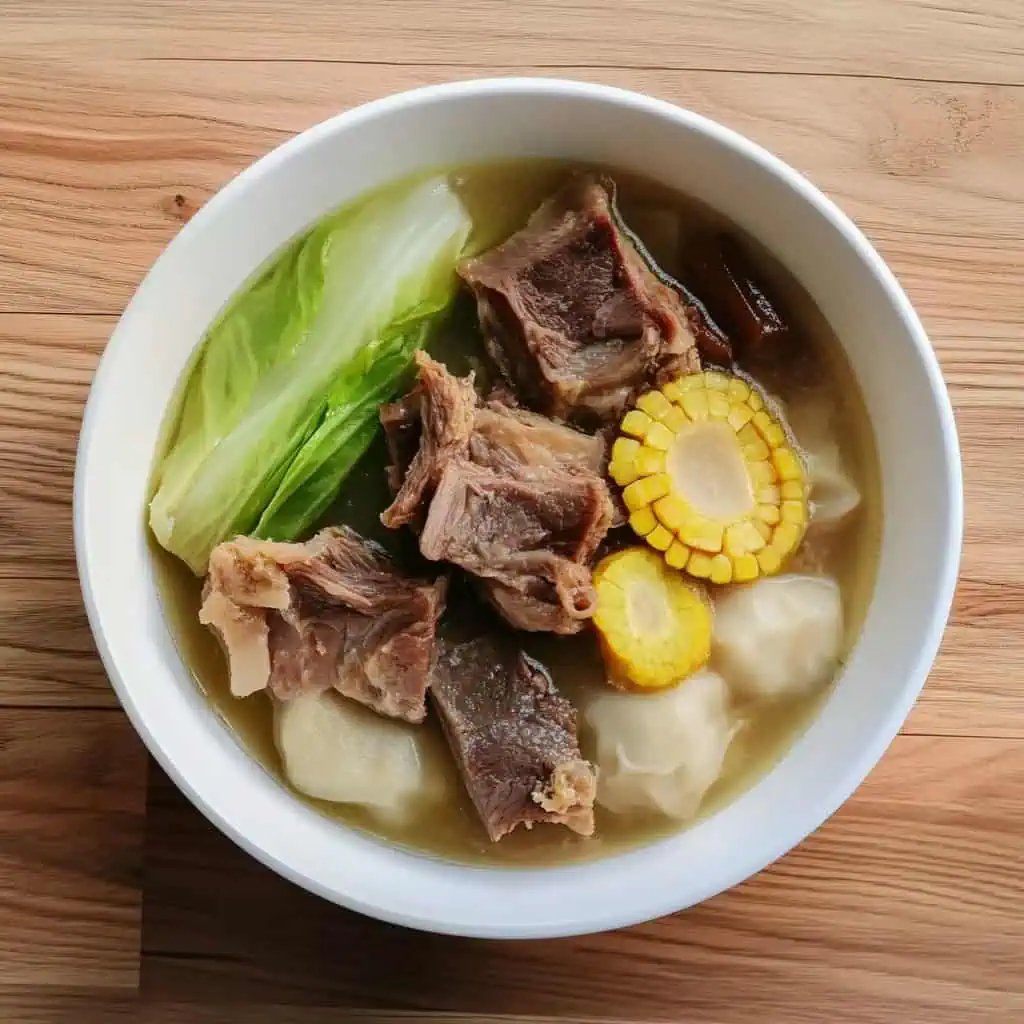
Why You'll Love This Recipe
- Fall-off-the-bone Tender: The long, slow cooking process ensures incredibly tender meat
- Crystal Clear Broth: Our special technique guarantees a pristine, restaurant-style clear soup
- Rich in Flavor: Natural beef goodness without artificial seasonings
- Complete Meal: Protein, vegetables, and soup all in one dish
- Budget-Friendly: Makes the most of affordable beef cuts
- Perfect for Any Weather: Comforting in rain or shine
- Family-Style Serving: Ideal for Filipino family gatherings
- Health Benefits: Rich in collagen, minerals, and protein
Ingredients
Each ingredient in Bulalo plays an essential role in creating this beloved Filipino dish. Beef shanks with marrow bones form the foundation, releasing rich collagen for body and flavor during slow cooking.
Onions and peppercorns create a fragrant base, while fish sauce adds that unmistakable Filipino umami depth. The vegetable selection balances the richness: corn provides natural sweetness, potatoes add heartiness, pechay contributes freshness, and celery offers subtle aromatic notes.
The condiments (calamansi, chili, patis) allow each diner to customize their bowl to personal taste, following the Filipino tradition of communal eating with individual flavor adjustments.
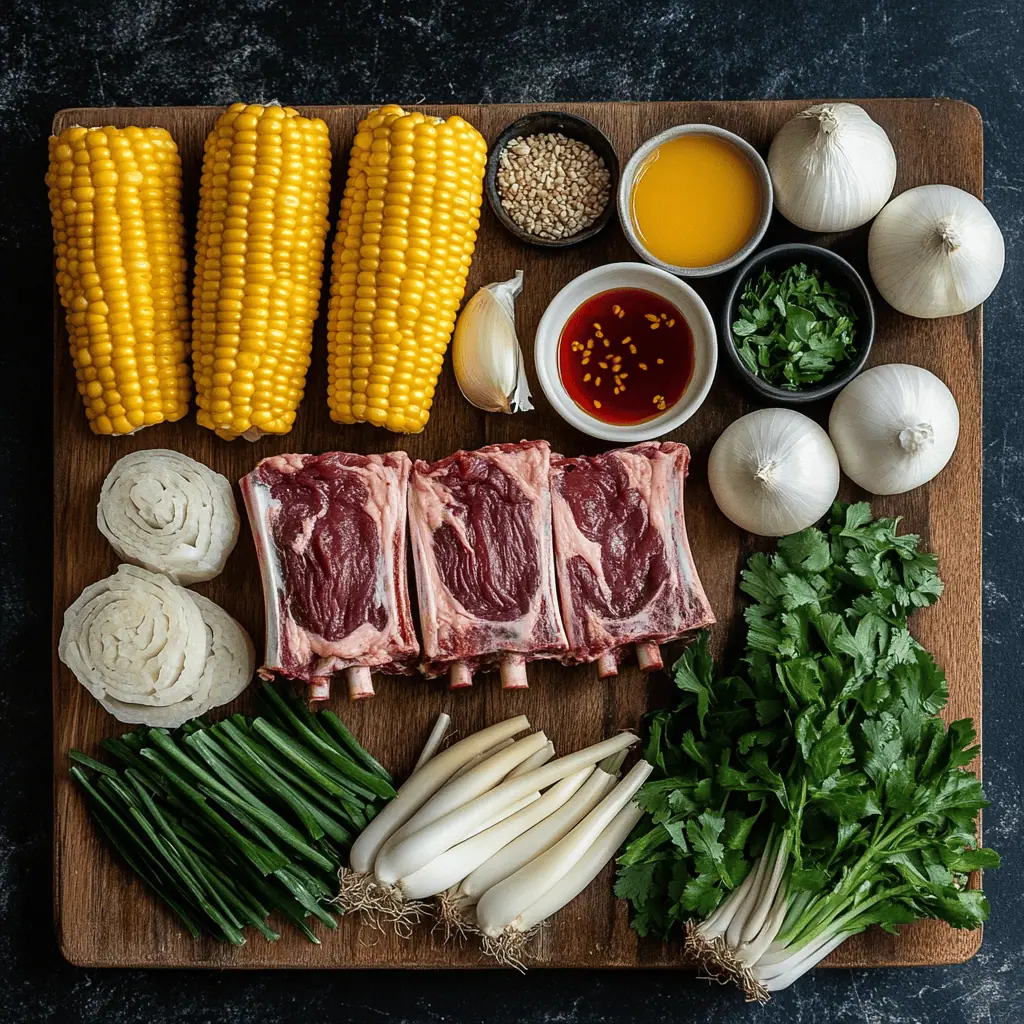
For the Broth:
- 3 lbs beef shanks with bone marrow (buto-buto)
- 2 whole onions, quartered (sibuyas)
- 2 tablespoons whole black peppercorns (paminta)
- 2 tablespoons fish sauce (patis)
- Salt to taste (asin)
- 12-14 cups water (tubig)
Vegetables:
- 2 corn on the cob, halved (mais)
- 1 large bundle Chinese cabbage/pechay (pechay Baguio)
- 2 medium potatoes, quartered (patatas)
- 2 stalks celery, cut into 2-inch pieces
- 2 green onions, cut into 2-inch lengths (sibuyas dahon)
For Serving:
- Fish sauce (patis)
- Calamansi or lime
- Thai chili peppers, chopped (siling labuyo)
- Steamed rice (kanin)
Equipment
- Large Stock Pot (12-quart minimum) - Provides ample space for bones and liquid to create a rich, flavorful broth
- Mesh Skimmer - Essential for removing impurities to achieve that crystal-clear broth
- Sharp Chef's Knife - For precise cutting of vegetables and separating meat if needed
- Large Cutting Board - Provides adequate space for preparing ingredients
- Long-handled Wooden Spoon - Helps stir the deep pot without burning your hands
- Ladle - For serving the soup while capturing both broth and chunky ingredients
- Deep Serving Bowls - Traditional Filipino presentation requires deep bowls to hold ample broth and ingredients
- Small Condiment Dishes - For individual servings of dipping sauces and garnishes
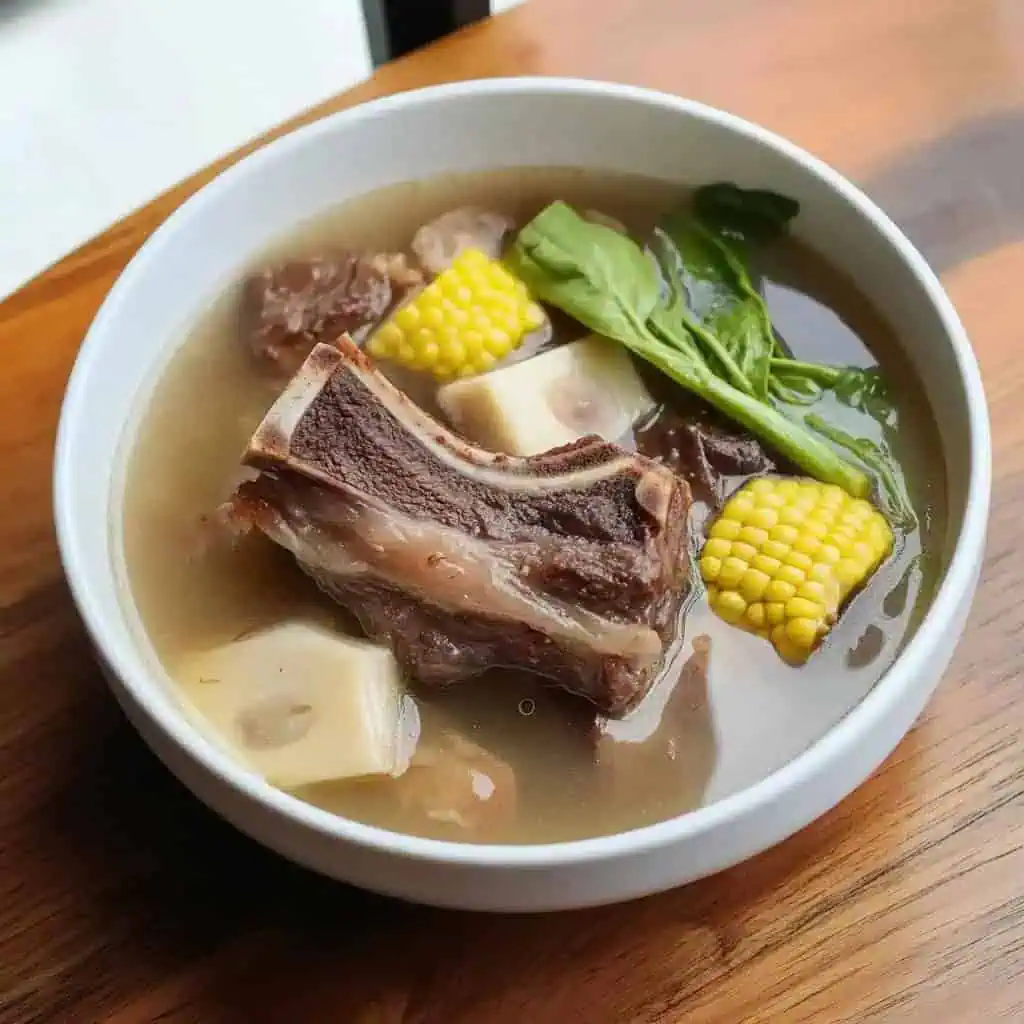
How To Make
1. Prepare and Clean the Meat (30 minutes)
- Thoroughly clean the beef shanks under cold running water, removing any bone fragments or impurities.
- Fill a large pot with cold water and add the cleaned beef shanks.
- Bring the water to a full boil (this will take about 10 minutes).
- Once boiling, carefully drain the water and rinse both the pot and the meat thoroughly.
- This blanching process is crucial for achieving the characteristic clear broth by removing blood and impurities.
2. Start the Slow Simmer (2-2.5 hours)
- Return the cleaned meat to the pot and add fresh cold water until the meat is completely covered (about 12-14 cups).
- Add the quartered onions, whole peppercorns, and fish sauce.
- Bring to a boil again, then immediately reduce heat to maintain a gentle simmer at 85-90°C/185-195°F.
- Let the broth simmer gently for 2 to 2.5 hours, occasionally skimming any foam or impurities that rise to the surface.
- The meat should be tender but still holding its shape when pierced with a fork.
3. Add the Vegetables (30 minutes)
- After the meat is tender, add the quartered potatoes and corn.
- Continue simmering for 10-15 minutes until the potatoes are almost cooked through.
- Add the celery pieces and cook for another 3-5 minutes. The celery should retain some crunch.
- Finally, add the pechay and green onions. Cook for just 2-3 minutes until the vegetables are bright green and crisp-tender.
4. Final Seasoning and Serving
- Taste the broth and adjust seasoning with salt as needed. The soup should be savory but not too salty.
- Serve hot in large, deep bowls.
- Place small dishes of fish sauce, calamansi, and chopped Thai chilies on the table so each person can season their portion to taste.
- Always serve with hot steamed rice.
- For the traditional experience, encourage diners to scoop out the bone marrow and add it to their rice or soup, seasoning with patis and calamansi for extra flavor.

Tips from Lola's Kitchen
For Crystal-Clear Broth:
- Always start with cold water when making the stock
- Never skip the initial blanching and rinsing step
- Maintain a gentle simmer throughout cooking - never allow it to boil rapidly
- Skim frequently and thoroughly, especially during the first hour
For Maximum Flavor:
- Choose shanks with visible, generous marrow centers
- Look for cuts with some fat marbling for richer flavor
- Add extra beef bones if available for a more intense broth
- Season gradually throughout the cooking process
- Fresh meat always yields better results than frozen
For Perfect Texture:
- Patience is key - rushing will result in tough meat and cloudy broth
- The ideal doneness is when meat is tender but not falling apart
- Add vegetables in stages based on their cooking times
Substitutions
Meat Options:
- Beef leg bones - A good substitute if shanks are unavailable
- Beef neck bones - Add excellent flavor but have less meat
- Beef short ribs - More meat but less marrow
- Oxtail - Creates an intensely rich broth with different texture
- Bone-in beef chuck - Budget-friendly alternative with good flavor
Vegetable Substitutions:
- Regular cabbage - Use instead of pechay (cook for slightly longer)
- Bok choy - A good alternative to pechay with similar cooking time
- Carrots - Can replace or complement potatoes for natural sweetness
- String beans - Add for more variety and nutrition
- Sweet corn kernels - Can be used if corn on the cob isn't available
Seasoning Alternatives:
- Sea salt - If fish sauce isn't available
- Soy sauce - A different but complementary flavor profile
- Lemon - Can substitute for calamansi
- Bay leaves - Add 1-2 for subtle aromatic notes
Troubleshooting
Problem: Tough Meat
- Cause: Insufficient cooking time or too high heat
- Solution: Continue simmering at low heat until tender
- Prevention: Choose meat with more connective tissue for better breakdown
Problem: Cloudy Broth
- Cause: Rapid boiling or insufficient skimming
- Solution: Strain broth through cheesecloth if needed
- Prevention: Maintain lower heat and skim more frequently
- Pro Tip: Chill leftover soup and remove solidified fat for clearer broth
Problem: Bland Taste
- Cause: Insufficient seasoning or too much water
- Solution: Add fish sauce gradually until desired flavor is reached
- Prevention: Season in layers throughout cooking process
- Enhancement: Try adding a knob of ginger during simmering
Problem: Greasy Broth
- Cause: Too much fat in the meat cuts
- Solution: Let soup rest, then skim fat from top
- Prevention: Trim excess fat before cooking
Storage & Reheating
Refrigerator Storage:
- Cool completely before refrigerating
- Store in airtight containers for 3-4 days
- Separate vegetables if storing for more than a day to prevent overcooking
- Natural gelatin will cause the broth to solidify when cold - this is normal and desirable
Freezer Storage:
- Freeze broth and meat separately from vegetables for best results
- Store in freezer-safe containers for up to 3 months
- Label with date and contents
- Leave expansion space in containers
Reheating Methods:
- Stovetop (Best Method): Reheat on low heat until simmering
- Microwave: Use 2-3 minute intervals, stirring between
- Add Fresh Vegetables: Consider adding fresh vegetables during reheating
- Revitalize Flavor: Add a splash of fish sauce when reheating to refresh flavor
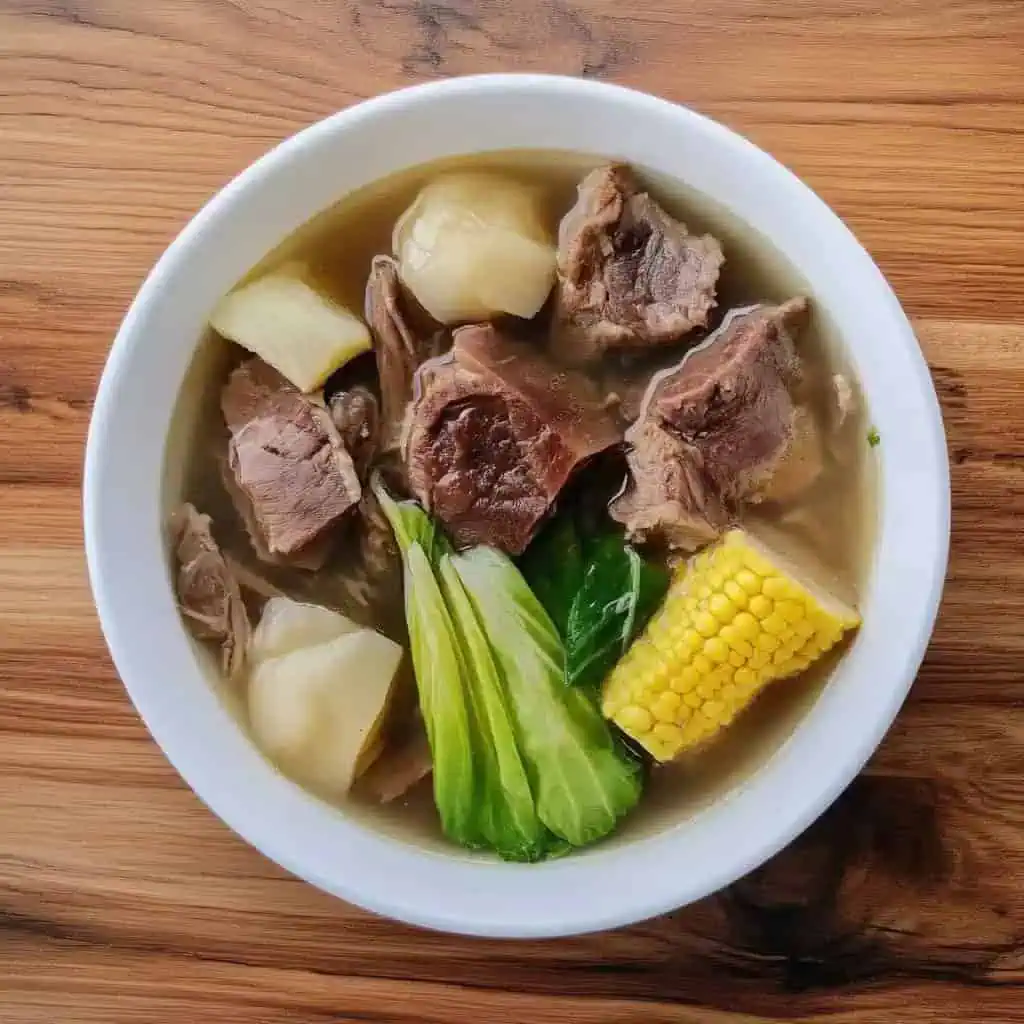
FAQ
How do I know when the meat is perfectly done?
The meat should be fork-tender but not completely falling apart. You should be able to pull it apart with light pressure from your fork.
Can I cook this in a pressure cooker to save time?
Yes! Use the pressure cooker for 45-60 minutes on high pressure for the meat, then add vegetables after releasing pressure and simmer normally. This preserves the vegetables' texture while still tenderizing the meat.
Is it necessary to blanch the meat first?
Yes, this step is crucial for achieving clear broth. Blanching removes blood and impurities that would otherwise cloud the soup.
Can I use beef bones without meat for this recipe?
For authentic bulalo, you need beef shanks with meat. Pure bones will give you a good broth but won't provide the complete bulalo experience.
Is fish sauce (patis) absolutely necessary?
While you can substitute with salt, authentic Filipino bulalo gets much of its depth from fish sauce. The fermented flavor adds umami that can't be replicated with salt alone.
What if I can't find beef shanks with marrow?
Ask your butcher for "soup bones" or "osso buco cuts." In a pinch, beef neck bones or short ribs plus some marrow bones will work.
How do I eat the bone marrow?
Use a small spoon to scoop it out of the bone. It's traditionally added to rice or stirred into the broth. Some people spread it on bread with a sprinkle of salt.
Why does my leftover soup turn to jelly in the refrigerator?
This is a sign of success! The collagen from the bones has been properly extracted and will turn to gelatin when cold. It will liquefy again when reheated.
Can I prepare this dish ahead for a party?
Yes! Cook the meat and broth a day ahead, then refrigerate. The next day, skim solidified fat, reheat, and add fresh vegetables just before serving.
Related
Looking for other recipes like this? Try these:
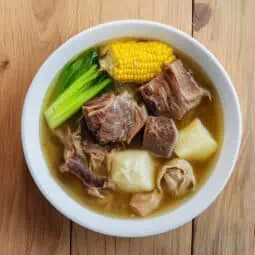
Filipino Bulalo (Bone Marrow Soup)
Equipment
- Large stock pot (malaking kaldero)
- Skimmer or strainer (sandok)
- Sharp knife (kutsilyo)
- Cutting board (chopping board)
- Serving bowls (mangkok)
Ingredients
For the Broth
- 3 lbs beef shanks with bone marrow buto-buto
- 2 whole onions quartered (sibuyas)
- 2 tablespoons whole black peppercorns paminta
- 2 tablespoons fish sauce patis
- Salt to taste asin
- 12-14 cups water tubig
Vegetables
- 2 corn on the cob halved (mais)
- 1 large bundle Chinese cabbage/pechay pechay Baguio
- 2 medium potatoes quartered (patatas)
- 2 stalks celery cut into 2-inch pieces
- 2 green onions cut into 2-inch lengths (sibuyas dahon)
For Serving
- Fish sauce patis
- Calamansi or lime
- Thai chili peppers chopped (siling labuyo)
- Steamed rice kanin
Instructions
- Thoroughly clean the beef shanks under running water (Hugasan mabuti ang buto-buto). Fill a large pot with cold water and add the cleaned beef shanks. Bring the water to a full boil (Pakuluan hanggang kumulo) - this will take about 10 minutes.
- Once boiling, drain the water and rinse both the pot and the meat to remove impurities (Hugasan ang kaldero at karne). This first boiling helps achieve a clear broth later.
- Return the cleaned meat to the pot and add fresh cold water until the meat is completely covered (Lagyan ng sapat na tubig). Add the quartered onions, whole peppercorns, and fish sauce (Idagdag ang sibuyas, paminta, at patis). Bring to a boil again, then immediately reduce heat to maintain a gentle simmer at 85-90°C/185-195°F (Ibaba ang apoy at pakuluan ng banayad).
- Let the broth simmer gently for 2 to 2.5 hours (Pakuluan ng dahan-dahan ng dalawang oras), occasionally skimming any foam or impurities that rise to the surface (Alisin ang bumubula sa ibabaw). The meat should be tender but still holding its shape when pierced with a fork (Kapag malambot na ang karne pero hindi pa nagkakadurug-durog).
- After the meat is tender, add the quartered potatoes and corn (Idagdag ang patatas at mais). Continue simmering for 10-15 minutes until the potatoes are almost cooked through (Pakuluan hanggang malambot ang patatas).
- Add the celery pieces (Idagdag ang kintsay) and cook for another 3-5 minutes. The celery should retain some crunch (May crunch pa dapat ang kintsay).
- Finally, add the pechay and green onions (Idagdag ang pechay at dahon ng sibuyas). Cook for just 2-3 minutes until the vegetables are bright green and crisp-tender (Hanggang lumambot ng kaunti ang gulay).
- Taste the broth and adjust seasoning with salt as needed (Timplahan ng asin kung kinakailangan). The soup should be savory but not too salty, as diners can add more fish sauce to taste.
- Serve hot in large, deep bowls (Ihain ng mainit sa malalaking mangkok). Place small dishes of fish sauce, calamansi, and chopped Thai chilies on the table so each person can season their portion to taste (Lagyan ng sawsawan: patis, kalamansi, at siling labuyo). Always serve with hot steamed rice (Ihain kasama ang mainit na kanin).
- For the traditional way of eating bulalo, encourage diners to scoop out the bone marrow and add it to their rice or soup. The marrow can be seasoned with a little patis and calamansi for extra flavor (Masarap timplahan ng patis at kalamansi).
Tips from Lola's Kitchen
- Clear Broth Secret (Malinaw na Sabaw)
- Always start with cold water
- Blanch meat first to remove impurities
- Maintain gentle simmer, never rapid boil
- Flavor Enhancement
- Add beef bones with more marrow for richer broth
- Don't skip the blanching step
- Season gradually throughout cooking
- Meat Selection
- Look for shanks with visible marrow
- Choose cuts with some fat marbling
- Fresh meat is always better than frozen
Nutrition
The Story Behind Filipino Bulalo (Bone Marrow Soup)
Deep in the mist-covered hills of Tagaytay and across the cattle-rich provinces of Batangas, Filipino Bulalo has been warming hearts and satisfying souls for generations. This iconic bone marrow soup, known locally as "bulalo" or "kansi" in some regions, stands as a testament to Filipino culinary ingenuity, transforming humble beef shanks and marrow bones into what many consider the ultimate comfort food of Southern Luzon.
The origins of this beloved dish can be traced back to the flourishing cattle industry of Batangas province in the early 20th century. Local farmers and ranchers, blessed with an abundance of livestock, developed this hearty soup to make use of every part of their cattle. The cool climate of highland regions like Tagaytay made it the perfect location for enjoying a steaming bowl of bulalo, leading to the emergence of countless roadside bulalohan (bulalo restaurants) that would soon become cultural landmarks.
What makes Filipino Bulalo truly special isn't just its ingredients – it's the cooking process that has been perfected over decades. The signature crystal-clear broth, achieved through patient simmering and careful skimming, reflects the dedication of generations of Filipino cooks who understood that great flavor cannot be rushed. This transparency of the soup isn't just about aesthetics; it's a mark of expertise, showing that the cook has mastered the art of drawing out the beef's natural flavors without compromising the broth's clarity.
In Filipino culture, Bulalo transcends its role as mere sustenance. It's a dish that brings families together, often served in large, steaming bowls meant for sharing. During the cooler months, when fog rolls into Tagaytay or rain patters against windows in Batangas, locals and tourists alike seek out their favorite bulalohan for that perfect combination of tender beef, buttery marrow, and soul-warming broth. The dish has become so iconic that it's now considered a must-try experience for anyone visiting these regions.
Modern interpretations of Bulalo have emerged across the Philippines, from the spicy variations in the Visayas to fusion versions in Manila's contemporary restaurants. However, purists maintain that the best Bulalo is still found in its birthplace – the Southern Luzon region, where the tradition of slow-cooking beef shanks and bones continues much as it has for generations. Here, the dish remains a source of local pride, with each restaurant claiming to have the clearest broth or the most tender meat.
The popularity of Bulalo extends beyond its taste. The slow-cooking process releases collagen and minerals from the bones, making it not just delicious but nutritious as well. This aspect of the dish aligns perfectly with the growing global interest in bone broth and its health benefits, though Filipinos have long known about these properties, considering Bulalo a natural remedy for everything from colds to hangovers.
For many Filipinos, both at home and abroad, Bulalo represents more than just a meal – it's a connection to their heritage. The rich, fatty marrow, known locally as "utak" (literally meaning "brain"), is considered the prize of the dish, often saved for the eldest family members or special guests as a sign of respect. This practice reflects the deep-rooted Filipino values of family hierarchy and hospitality.
In recent years, as Filipino cuisine gains international recognition, Bulalo has emerged as one of the country's most celebrated dishes. Its simple yet profound flavors represent everything that makes Filipino food special – the ability to transform humble ingredients into something extraordinary, the importance of patient cooking, and the central role of sharing meals in Filipino culture.
Whether enjoyed in a modest roadside eatery in Batangas, a foggy restaurant in Tagaytay, or lovingly recreated in homes across the globe, Bulalo continues to tell the story of Filipino culinary heritage. It reminds us that some of the most meaningful dishes are born not from luxury, but from tradition, necessity, and the timeless comfort of a steaming bowl of soup shared with loved ones.
Remember: Perfect bulalo isn't about fancy ingredients—it's about the patience to let the bones slowly release their flavor and the skill to achieve that pristine, clear broth that marks a master's touch.
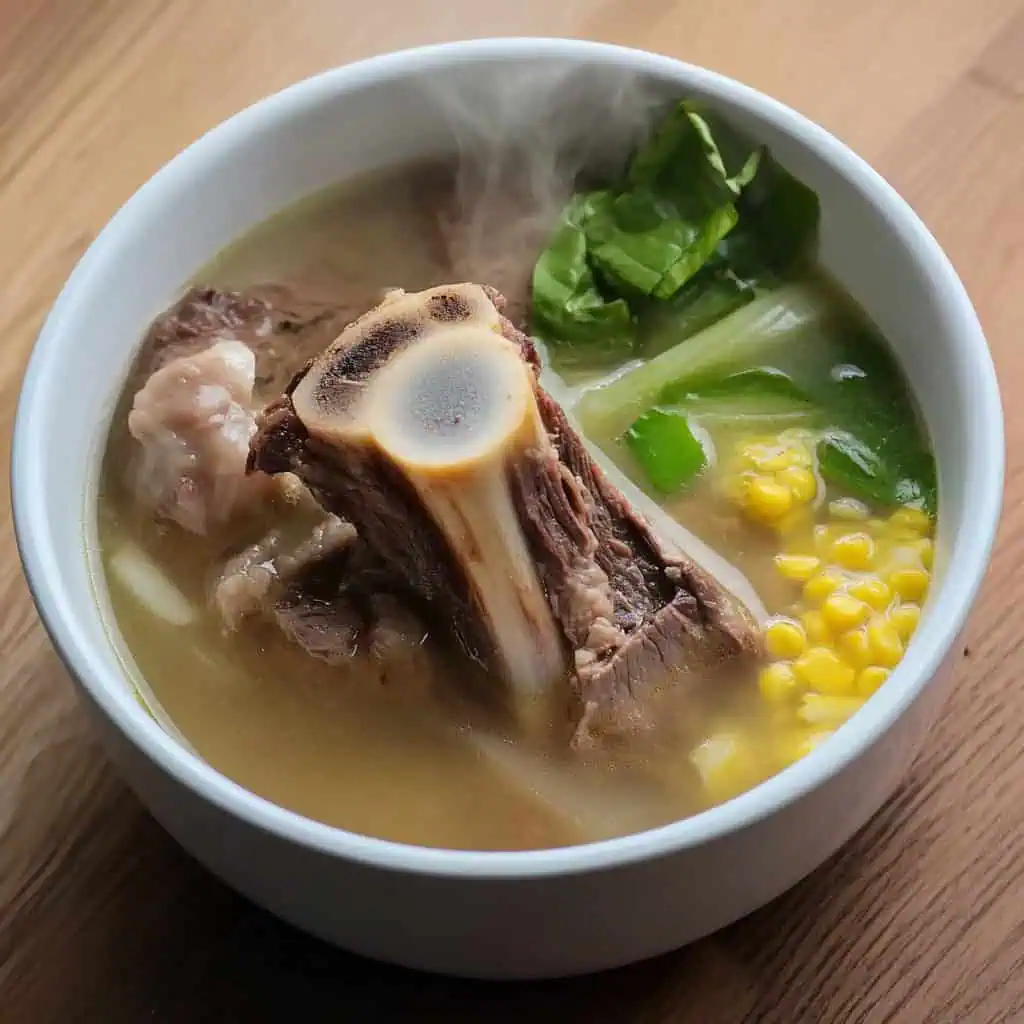


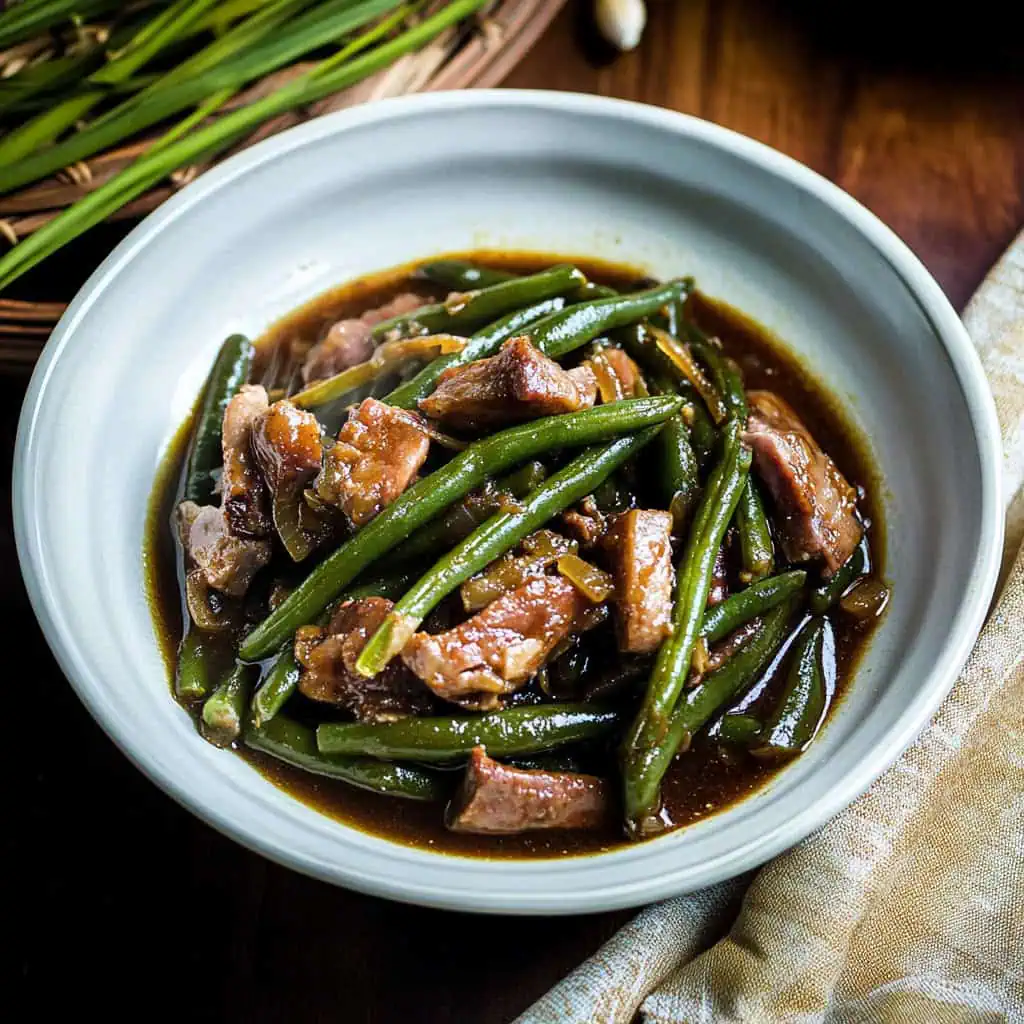

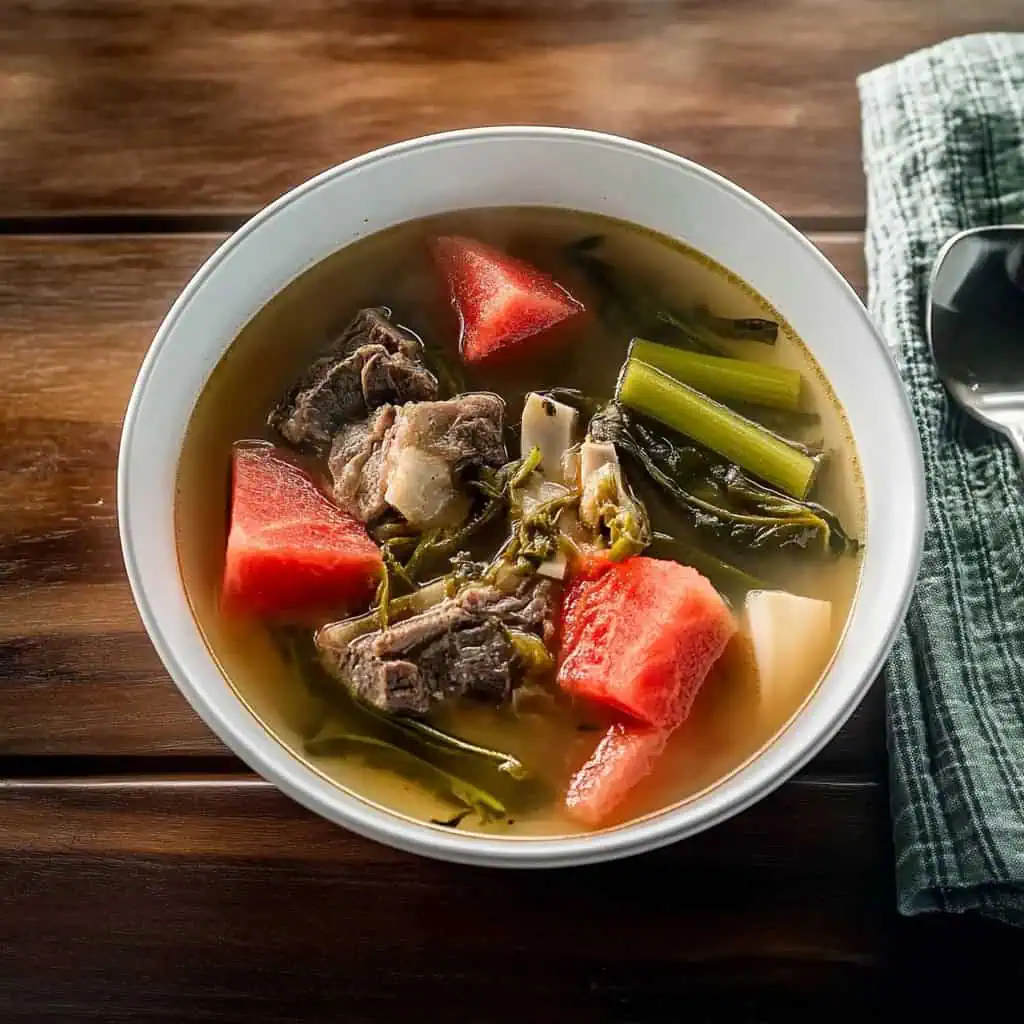




Comments
No Comments